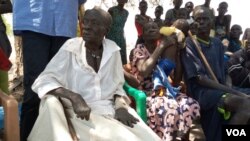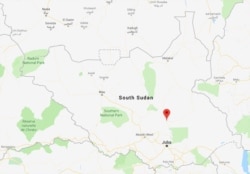In a green valley near the banks of the River Nile about 20 kilometers south of Bor town lies Malek, a small South Sudanese village dotted with grass-thatched huts, where people diagnosed with leprosy are forced to live with each other and their children in an isolation camp. They live out their days in extreme poverty because they are shunned by their own communities, many of them too weak to provide for themselves.
Malek resident Monica Yom Kulang, 43, is a mother of four living with leprosy. The visibly frail woman rests under a desert date tree in the village. Yom says her relatives abandoned her 20 years ago because of her leprosy. Yom broke her left arm earlier this week by tripping on a tree log while walking out of her dark hut at night.
“Life is very difficult. You see now I’m feeling a lot of pain. Have you seen my broken arm? I’m weak. There is no energy, and that is because there is no food. There used to be some food assistance from the government, but many months ago that stopped. We are just suffering. No food, no medicine, there is nothing,” Yom told South Sudan in Focus.
She said patients like her are in dire need of food, clothing and health care, not to mention a school and teachers for her children, but “nobody seems to care much.” Their only neighbors are baboons that climb in nearby forests and hippopotamus that keep cool in the River Nile, according to Yom.
Yom says her family and other leprosy victims and their children survive on food items donated by a handful of churches and well-wishers.
Poor shelter, little food
Local traditional chief Peter Akoy Madhor, 37, said his father, a leper, died a month ago. Madhor said people like his father are in desperate need of things they no longer receive from the government.
“The grass-thatched shelters you see here were put up in 2013, and since then there hasn’t been proper renovation. They are almost falling on people now,” Madhor told South Sudan in Focus. “Number two, there is not enough food available. There is no life without food. We also need a clinic. It will really be helpful because now even other diseases, not leprosy, can kill.”
The people with leprosy also need canoes for fishing so they can try to feed themselves, says Madhor.
He says many lepers in the camp lack food and shelter because they are not strong enough to plant crops or build huts of their own.
Many adult leprosy patients in Malek have lost toes and fingers because of the crippling disease.
Dr. Ronald Ssemanda of the Sera Medical Clinic in Bor says leprosy is a chronic, progressive bacterial infection caused by the bacterium Mycobacterium Leprae. He says the disease mostly affects the nerves of the extremities such as skin, the lining of the nose and the upper respiratory tract. It often produces skin ulcers, nerve damage and muscle weakness.
It's treatable
But Ssemanda says, unlike in ancient times when there was no treatment, leprosy is completely curable today.
“Treatment is there, especially for children from 2 years and above. So the preventive thing is identifying somebody with early signs. Early signs usually are the skin changes,” Ssemanda told South Sudan in Focus.
People with leprosy are typically stigmatized in South Sudan because there are few treatment options available to them and most villagers fear they will catch the highly contagious disease.
Malek village, known in the Dinka language as pan-abil or “leprosy victims,” was created in the late 1960s to host people suffering from the disease. Decades later, its name was changed to “paan-koch lajik,” meaning “home of the holy people.” The more than 200 leprosy victims in Malek predominantly come to the camp from Jonglei, Lakes and Central Equatoria states.
Duot Akech, director general in the Jonglei state ministry of social welfare, says state officials have no funds to support families living in Malek village.
“We used to help them as a government, but the financial crisis now cannot allow it. We have challenges, you know, our government here, and we have nothing in hands from the government. So we refer them to the U.N.,” Akech told South Sudan in Focus.
According to the latest figures available from the World Health Organization, 208,619 new cases of leprosy were reported in 2018 from 127 countries.





